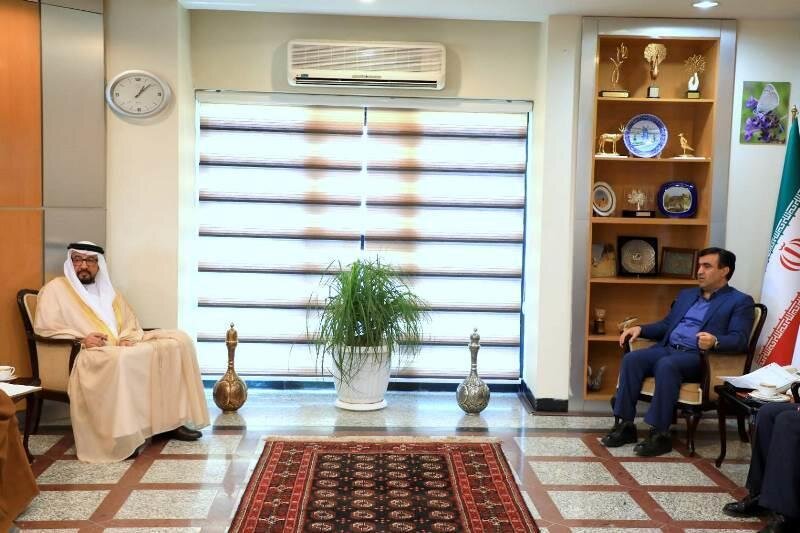Tehran to host ROPME summit on protection of marine environment

TEHRAN - The upcoming meeting of the Regional Organization for the Protection of Marine Environment (ROPME) of the eight Persian Gulf coastal countries will be held this year in Tehran, Department of Environment Chief Ali Salajeqeh announced on Thursday.
He made the announcement in a meeting in Tehran with Saif Mohammed Al Zaabi, the ambassador of the United Arab Emirates to Tehran, IRIB reported.
ROPME was established in Kuwait in 1979 and was quickly ratified by seven member states (Iran, Bahrain, Iraq, Oman, Qatar, Saudi Arabia, and the United Arab Emirates).
The main objective of ROPME is to coordinate efforts of the eight Member States towards protecting the marine and coastal environment and ecosystems in the ROPME Sea Area against marine pollution and stressors that might be induced by developmental activities or/and other drivers of change.
“Managing regional environmental challenges depends on the cooperation and coordination of the littoral countries,” Salajeqeh said, referring to the many commonalities of the countries of the Persian Gulf region in various areas.
Iran is ready to utilize all its capacities to help the UAE for the magnificent holding of the 28th United Nations Conference of the Parties (COP28) Climate Change Conference, he stressed.
He also invited the ambassador and the environment minister of the UAE to take part in the international conference on combating sand and dust storms which is scheduled to be held in Tehran on September 9-10.
The rapid growth of ROPME and shared coastal and marine environmental issues among littoral states have resulted in numerous successful plans laying the basis for future coastal management and development in the Persian Gulf region.
Persian Gulf ecosystem at risk
The Persian Gulf has an area of about 241,000 square kilometers. Its length is some 990 km, and its width varies from a maximum of about 340 km to a minimum of 55 km in the Strait of Hormuz.
There are tens of international conventions and protocols to protect the Persian Gulf marine environment, however, despite the fact that the Persian Gulf is of utmost importance economically, environmentally, and socially for the littoral cities, there is no collective effort to safeguard its marine life.
Some 60 percent of the world's oil reserves are in the Persian Gulf, and by building oil platforms and complexes, and refineries around it, we have provided the ground for the entry of oil, chemicals, and sewage into the water.
More than 10,000 ships pass through the Persian Gulf and the Sea of Oman annually, 75 percent of which are related to the transportation of crude oil and petroleum products.
The discharge of various waste materials such as engine washing water, sewage, and ship balance water has exacerbated the pollution in the Persian Gulf.
Carbon footprint is another damage done to aquatic environments, so the more carbon the water absorbs, the more acidic it becomes.
The results of an 8-year study show that changes in the pH of the aquatic environment have led to complex changes in the food chain and cause damage to aquatic animals whose exoskeleton is made of carbonates, such as starfish, oysters, and butterflyfish, and result in the instability of the shells of these organisms.
In recent years, the increase in water temperature in the Persian Gulf, along with the tensions caused by unstable development activities in the important water area, both on the north coast and especially on the part of the southern neighbors who have less adherence to the principles of environmental protection, have caused significant damages to the corals of the Persian Gulf.
Indian Ocean marine environment
In February, the third phase of the workshop series on the effects of climate on the Indian Ocean marine environment was held in Tehran.
The Indian Ocean Rim Association Regional Centre for Science and Technology Transfer (IORA RCSTT), the Iranian Research Organization for Science and Technology (IROST), the Iranian National Institute for Oceanography and Atmospheric Sciences (INIOAS), and the Regional Education and Research Centre on Oceanography for West Asia are holding the workshop.
The Indian Ocean Rim Association is an inter-governmental organization that was established on March 7, 1997.
The effects of climate change on the environment of the Indian Ocean and the introduction of measures taken to reduce the effects of climate change are discussed during the three-day event, IRNA reported.
The aim of the workshop is to enhance the knowledge of Member States and share information on the impacts of climate change on the marine environment.
The specific objectives are to promote sharing knowledge and findings on the effects of climate change on various aspects of the marine environment and ecosystem.
It also aims to enhance the capacities and skills of IORA Member States in sustainable management and conservation of marine biodiversity.
MG
Leave a Comment